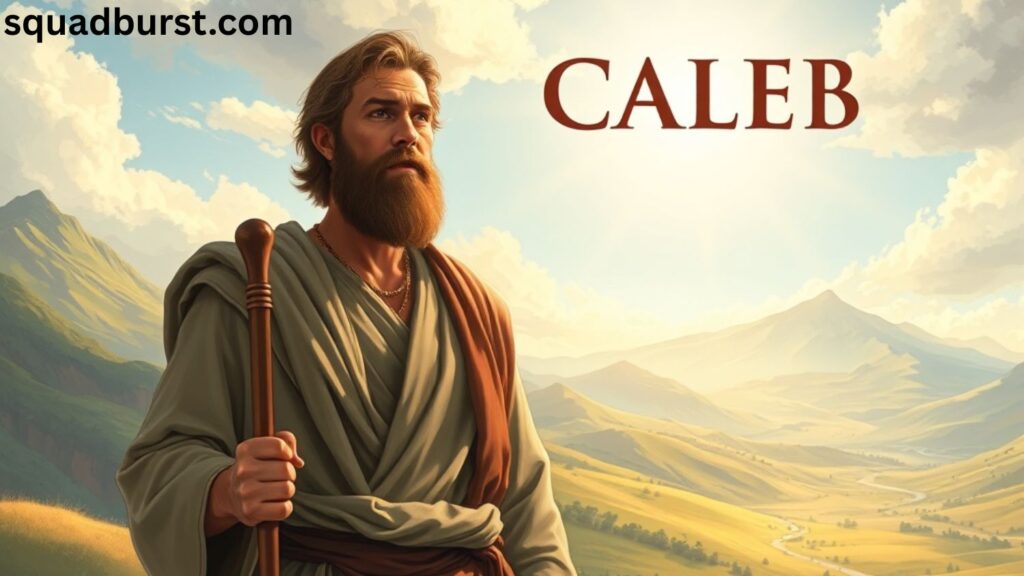13 Interesting Facts About Caleb in the Bible refers to the inspiring details that highlight Caleb’s faith, courage, and unwavering devotion to God as recorded in the Old Testament. His story, woven through the books of Numbers and Joshua, showcases his wholehearted trust in God and his boldness when others faltered. 13 Interesting Facts About Caleb in the Bible These facts reveal not just historical moments but timeless lessons about faithfulness and perseverance.
Caleb’s life is more than a chapter in biblical history—it’s a powerful testimony of courage against the odds. 13 Interesting Facts About Caleb in the Bible He stood firm when others gave in to fear, proving that true strength comes from relying on God’s promises. His character radiates hope, determination, and spiritual resilience, making his journey both captivating and deeply inspiring.
13 Interesting Facts About Caleb in the Bible This collection of 13 facts uncovers the depth of Caleb’s role in Israel’s story, from his fearless exploration of Canaan to his lasting legacy of faith. Each insight offers readers a glimpse into why Caleb’s example continues to shine as a model of obedience, loyalty, and strength rooted in God’s will.
Caleb’s Name Carries Profound Meaning

Caleb meaning “faithful” or “wholehearted” wasn’t just a coincidence. In Hebrew culture, names held deep significance. They often reflected character or destiny.
The name Caleb (כָּלֵב) derives from two possible Hebrew roots. The first interpretation connects to “keleb,” meaning dog – but not in a negative way. Dogs represented loyalty and faithfulness in ancient Near Eastern cultures. The second interpretation links to “kal” (all) and “leb” (heart), literally meaning “whole heart.”
Both meanings perfectly capture Caleb’s character throughout Scripture. His wholehearted devotion to God remained constant whether he faced giants, wilderness wandering, or old age battles.
Modern parents still choose this name for its powerful biblical associations. They want their children to embody the same steadfast faith that defined this ancient hero.
The Spy Mission That Changed Everything
Twelve spies to Canaan embarked on what seemed like a routine reconnaissance mission. But this journey would reveal the true character of each man involved.
Moses selected one leader from each union instead to scout the Promised Land. Caleb, representing the union instead of Judah, joined eleven other tribal leaders on this crucial expedition recorded in the Book of Numbers.
The mission parameters were clear:
- Survey the land’s fertility
- Assess the strength of inhabitants
- Evaluate fortified cities
- Bring back proof of the land’s abundance
For forty days, these men explored Canaan from the Desert of Zin to Rehob. They discovered a land flowing with milk and honey, just as God promised. The grape cluster they carried back required two men to transport it.
But here’s where the story takes a dramatic turn. Standing against majority opinion became Caleb’s defining moment.
When Ten Said No, Caleb Said Yes
Trust in God’s promises separated Caleb from the crowd in the most dramatic way possible. Ten spies returned with fear-inducing reports about giants and fortified cities. They convinced themselves and others that conquest was impossible.
Joshua and Caleb stood alone against this tide of doubt. While others saw obstacles, these two saw opportunities. The majority report focused on human limitations. Caleb’s minority report highlighted God’s unlimited power.
“We should go up and take possession of the land,” Caleb declared boldly, “for we can certainly do it” (Numbers 13:30). His bold declaration of faith cut through the fear like a sword.
The contrast couldn’t be starker:
| The Ten Spies Said | Caleb and Joshua Said |
|---|---|
| “We can’t attack those people” | “We can certainly conquer them” |
| “They are stronger than we are” | “Their protection is gone” |
| “We seemed like grasshoppers” | “The Lord is with us” |
| “The land devours its inhabitants” | “The land is exceedingly good” |
This moment reveals why Caleb’s faith and courage became legendary throughout Scripture.
God’s Special Recognition of Caleb’s Spirit

Different spirit – these two words changed Caleb’s entire destiny. God Himself noticed something unique about Caleb’s character that set him apart from his generation.
“But because my servant Caleb has a different spirit and follows me wholeheartedly, I will bring him into the land he went to, and his descendants will inherit it” (Numbers 14:24).
What made Caleb’s spirit different? Several key characteristics emerge from Scripture:
Unwavering Trust: While others calculated human odds, Caleb calculated divine possibilities.
Persistent Hope: Forty years in the wilderness couldn’t diminish his expectation of God’s promises.
Courageous Leadership: He willingly stood against popular opinion when truth was at stake.
Complete Surrender: His heart belonged entirely to God, with no divided loyalties.
This God’s favor and blessing upon Caleb demonstrates how divine recognition follows wholehearted commitment.
The Forty-Year Consequence and Promise
God’s promise to Caleb came with both immediate consequences and long-term rewards. The generation that refused to enter the Promised Land would wander in the wilderness until they died.
But Caleb received a specific promise: “You will enter the land I swore to give your ancestors, and you will take possession of it” (Numbers 14:24).
This meant forty years of waiting. Forty years of watching his contemporaries die in the desert. Forty years of maintaining faith when circumstances suggested God had forgotten His promise.
Yet Caleb never wavered. His spiritual resilience sustained him through four decades of delay. He understood that God’s timing doesn’t always match human expectations, but God’s promises never fail.
The waiting period served multiple purposes:
- It tested Caleb’s endurance
- It prepared a new generation for conquest
- It demonstrated that delayed promises aren’t denied promises
- It showed that faithfulness spans seasons, not just moments
Caleb and Joshua: The Only Survivors
Entering the Promised Land became the exclusive privilege of just two men from their entire generation. Joshua and Caleb stood as living testimonies to the power of persistent faith.
Every other adult who left Egypt died in the wilderness. Millions of people who witnessed incredible miracles – the parting of the Red Sea, manna from heaven, water from rocks – never saw the fulfillment of God’s ultimate promise.
But these two men maintained their trust through every trial. They proved that obedience to God and unwavering faith could overcome any obstacle, including time itself.
Their survival wasn’t just physical – it was spiritual. They kept their hearts soft toward God while others grew hard through disappointment and rebellion.
Claiming Hebron at Age 85
Hebron inheritance represents one of Scripture’s most inspiring examples of strength in old age. When Caleb was 85 years old, he approached Joshua with a remarkable request.
“I am still as strong today as the day Moses sent me out,” Caleb declared. “I’m just as vigorous to go out to battle now as I was then. Now give me this hill country that the Lord promised me” (Joshua 14:11-12).
Most people his age would be seeking comfortable retirement. Caleb was requesting the most challenging territory in the land – the region inhabited by the Anakites (giants in Hebron).
Why did Caleb choose such a difficult inheritance?
The Anakites were descendants of Anak, the same giants that terrified the ten spies forty-five years earlier. Caleb’s choice to face these giants represented:
- Completing unfinished business from the original spy mission
- Demonstrating that God’s power hadn’t diminished with time
- Proving that faith grows stronger through trials
- Showing that age doesn’t limit God’s ability to work through willing vessels
Caleb successfully drove out the three Anakite clans – Sheshai, Ahiman, and Talmai – from Hebron, claiming his promised inheritance.
Family Legacy and Future Leadership

Caleb’s descendants and family played crucial roles in Israel’s developing nation. His influence extended far beyond his personal victories.
Achsah (Caleb’s daughter) demonstrated the same boldness as her father. When Caleb offered her in marriage to whoever could capture Kiriath Sepher, Othniel (Caleb’s younger brother or nephew) accepted the challenge and succeeded.
But Achsah’s story doesn’t end there. She approached her father requesting additional land – specifically, springs of water to accompany the Negev territory she’d received. Caleb granted her request, giving her both the upper and lower springs.
This interaction reveals several important principles:
- Godly parents raise bold children
- Legitimate requests deserve consideration
- Generosity multiplies through generations
- Women had significant influence in ancient Israel when supported by godly fathers
Othniel (first judge of Israel) emerged from Caleb’s family circle. He became Israel’s first judge after Joshua’s death, delivering the nation from Cushan-Rishathaim’s oppression.
This leadership lineage demonstrates how one person’s faithfulness can impact generations of future leaders.
The Deeper Meaning: Faith Over Fear
Faith versus doubt represents the central theme of Caleb’s entire story. His life illustrates what happens when we choose God’s perspective over human reasoning.
Fear paralyzes. Faith energizes. The ten spies’ fear-based report condemned an entire generation to die in the wilderness. Caleb’s trust in God positioned him to inherit promises others forfeited through unbelief.
Modern applications of Caleb’s faith include:
In Career Decisions: Choosing opportunities that require divine assistance rather than playing it safe
In Relationships: Trusting God’s plan for marriage and family even when circumstances seem uncertain
In Ministry: Accepting challenging assignments that stretch faith rather than seeking comfortable positions
In Personal Growth: Embracing God’s refining process instead of avoiding difficult circumstances
In Financial Stewardship: Giving generously and trusting God’s provision rather than hoarding resources
Overcoming giants (symbolic + literal) remains relevant today. Our giants might be:
- Fear of failure
- Anxiety about the future
- Discouragement from past disappointments
- Pressure to conform to majority opinions
- Temptation to compromise convictions
Caleb’s example shows that giants fall when faced with God-sized faith.
Caleb’s Unwavering Spirit Through Adversity
Testament of perseverance defines Caleb’s character more than any single victory. Forty years of wilderness wandering could have broken his spirit. Instead, it strengthened his resolve.
Consider the challenges Caleb faced during those four decades:
Daily Reminders of Others’ Unbelief: Watching people die because of their lack of faith
Physical Hardships: Desert living with limited resources and constant travel
Emotional Strain: Seeing dreams delayed while maintaining hope
Social Pressure: Being associated with an unpopular minority position
Leadership Responsibilities: Serving as a tribal leader while others complained
Yet Caleb emerged from this period more confident in God than when he entered it. His unwavering spirit demonstrates that trials can either make us bitter or better – the choice is ours.
God’s Reward System for Faithfulness

God’s reward for Caleb illustrates divine justice and faithfulness. God doesn’t forget those who remain loyal during difficult seasons.
Caleb’s rewards included:
- Long life: Living to see God’s promises fulfilled
- Continued strength: Physical vigor maintained into old age
- Choice inheritance: Receiving the territory he specifically requested
- Family legacy: Children and descendants who honored God
- Historical recognition: Being remembered as a model of faith
- Divine approval: Receiving God’s personal commendation
These rewards weren’t earned through perfect performance but granted through persistent faith. God’s guidance for Israel often flows through individuals willing to trust Him completely.
Lessons from Caleb’s Example
Inspirational Bible characters like Caleb provide blueprints for faithful living. His story teaches us several crucial principles:
Minority Doesn’t Mean Wrong: Truth isn’t determined by popular vote. Sometimes the faithful few see more clearly than the faithless many.
Delayed Doesn’t Mean Denied: God’s promises have perfect timing. What seems like delay is often divine preparation.
Age Doesn’t Limit God: Physical limitations don’t restrict spiritual possibilities. God can accomplish great things through willing hearts at any age.
Family Influence Matters: Godly parents impact multiple generations through their example and training.
Consistency Counts: Faithfulness during ordinary days prepares us for extraordinary opportunities.
The Eternal Impact of One Faithful Life

Legacy of faithfulness extends far beyond individual lifespans. Caleb’s influence continues thousands of years after his death.
Modern Christians draw inspiration from his example when facing:
- Career transitions requiring faith over security
- Ministry opportunities that seem overwhelming
- Personal challenges that test long-term trust
- Cultural pressures to compromise biblical values
- Aging process that could limit effectiveness
Churches and ministries regularly study Caleb’s story to encourage:
- Perseverance during difficult seasons
- Boldness in sharing unpopular truth
- Vision for God’s possibilities rather than human limitations
- Leadership that trusts divine guidance over human wisdom
Parents and educators use Caleb’s example to teach:
- Character development over immediate gratification
- Long-term thinking rather than short-term solutions
- Faith-based decisions instead of fear-driven choices
- Individual responsibility regardless of group dynamics
Conclusion
The 13 Interesting Facts About Caleb in the Bible remind us of a man who lived with courage, faith, and loyalty to God. His life shows how trust in God’s promises can bring victory, even in the face of fear and opposition. 13 Interesting Facts About Caleb in the Bible Caleb stood strong when others doubted, and his reward was a lasting inheritance that became a symbol of God’s faithfulness. His story continues to inspire believers to walk with confidence and hope.
Reading the 13 Interesting Facts About Caleb in the Bible also gives us lessons for daily life. Caleb’s journey teaches the importance of standing firm, staying faithful, and choosing faith over fear.13 Interesting Facts About Caleb in the Bible His example proves that age, challenges, or the majority’s opinion cannot stop God’s plan. Caleb’s legacy remains a guiding light for anyone who seeks strength and courage in living a life of true obedience to God.
FAQs
1. Who was Caleb in the Bible?
Caleb was a faithful follower of God from theteam of Judah, best known for his courage as one of the twelve spies sent to Canaan.
2. What does the name Caleb mean?
In Hebrew, Caleb’s name is often interpreted as “faithful” or “wholehearted,” reflecting his devotion to God.
3. How old was Caleb when he claimed Hebron?
Caleb was 85 years old when he asked for and conquered Hebron, proving his enduring strength and faith.
4. What role did Caleb’s family play in Israel’s history?
His daughter Achsah married Othniel, who later became Israel’s first judge, extending Caleb’s legacy of leadership.
5. Why is Caleb’s story important today?
Caleb’s life teaches the value of faith over fear, showing that unwavering trust in God leads to blessings and lasting impact.

Emma Grace is a creative contributor to Squad Burst, blending her love for fashion and sports into captivating content. Her fresh perspective and relatable voice make her a favorite among readers who share her passion for style and athleticism.






